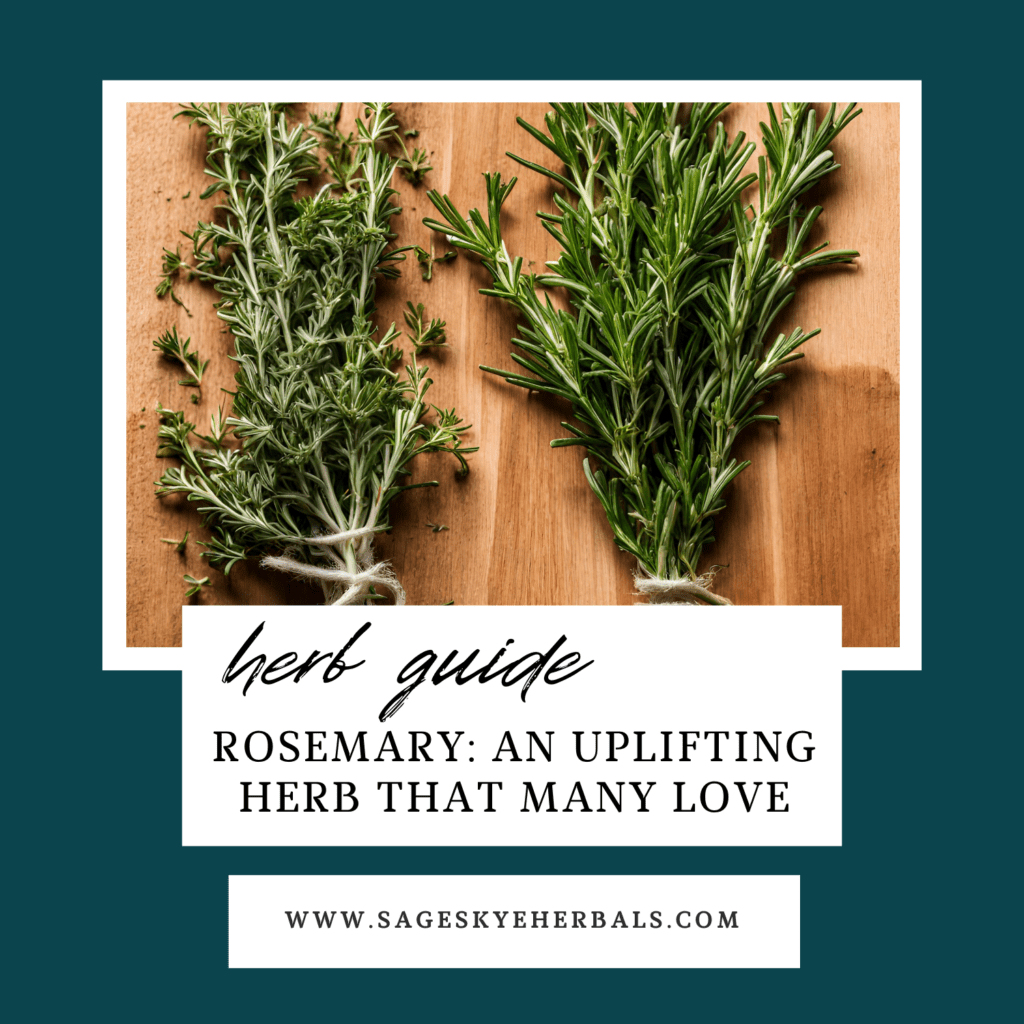
Rosemary
Binomial Name: Rosmarinus officinalis (Lamiaceae)
Rosemary is a bushy evergreen shrub that can grow for up to 30 years! It is native to the Mediterranean region and is cultivated around the globe. It is a familiar herb known to many in the kitchen. It’s usually found in spice blends or used to season broths, steaks, infused butter, you name it! It has also been used for hundreds of years (at least) for its medicinal properties.
Rosemary has significant antimicrobial, anti-inflammatory, anti-oxidant, anti-apoptotic, anti-tumorigenic, antinociceptive, and neuroprotective properties. Furthermore, it shows important clinical effects on mood, learning, memory, pain, anxiety, and sleep (1) Below we will go over the many scientifically backed uses of Rosemary and how to use the herb for your wellness.
This amazing herb, Rosemary, is an absolute essential in my home! I truly believe that everyone should have it readily available, whether it’s in your spice cabinet or stocked in your home apothecary. I rely on Rosemary for promoting hair growth, incorporating it into tea blends, and enhancing the flavor of every broth I prepare. You’ve got to try my latest creation – a simple and quick rosemary hair water recipe that will effortlessly introduce this incredible plant into your routine!
Parts Used: Leaves (Fresh and Dried)
Key Constituents: Volatile Oil (borneol, camphor, cineole, camphene) Flavonoids, Rosmarinic Acid, Diterpenes
Energetics: Warming, drying, slightly constricting
Key Actions: Tonic, Astringent, Stimulant, Nervine, Anti-Inflammatory, Antioxidant
Uses and Research
- Memory & Learning
Rosemary has anti-aging effects due to the antioxidants and has a positive impact on learning and memory according to this study.
- Stress Relief & Anxiety
Rosemary has been found to significantly reduce anxiety and stress. Among other findings, this particular study says “The capacity of this plant product to provide stress relief in situations of real danger could be an alternative to the conventional medicines, which may lead to various side effects and addiction.”(5)
- Circulatory Stimulant
Rosemary has a central place in European Herbal Medicine as a warming, tonic remedy that stimulates blood flow throughout the body, especially in those with low blood pressure. (Chavallier, p.128)
- Sore Throat
Due to its potent anti-inflammatory and antimicrobial properties, Rosemary is an exceptional home remedy for addressing a troublesome sore throat. Gargling a solution of 1-3 teaspoons of Rosemary tincture diluted in warm water or a strong infusion can effectively alleviate the discomfort associated with a sore throat.
- Tired Muscles
Rosemary stands out as the ideal herb for creating a rejuvenating herbal bath soak. Its exceptional properties can effectively relieve tired and achy muscles. For a revitalizing herbal bath soak with Rosemary, simply combine 20 to 25 grams of the herb with approximately 3 cups of water. After allowing it to steep for 10 minutes, pour the infusion into your bath. For an enhanced experience, consider incorporating other complementary herbs such as thyme or lavender, along with Epsom salt to further alleviate any discomfort.
- Hair Growth
Rosemary can be found in many hair products like oils or shampoos due to its ability to help with hair growth and a healthy scalp. Rosemary oil (Rosmarinus officinalis L.) is a medicinal plant with diverse actions, including enhancing microcapillary perfusion, which might explain its usefulness in reducing hair loss and increasing hair growth. (7) Another study showed that rosemary can help manage bacterial infections. If hair loss is due to a bacterial scalp infection, rosemary oil may help clear the infection and regrow hair. (9)
- Addiction
A study was done using rosemary in addition to treatment for opioid withdrawals and 81 patients, it has been confirmed that rosemary (8-16 capsules/day, containing 300 mg dried leaves of rosemary) could be used as an herbal medicine for alleviating withdrawal syndrome symptoms during treatment strategies for opium addiction and likely addiction to other opioids. In this study, the effectiveness of rosemary in the reduction of insomnia, and musculoskeletal pain in opium addicts and improvement of sleep was demonstrated during 4 weeks (1)(3)
- Food Preservative
Rosemary extract (RE) has been tested for food preservation due to its ability to prevent oxidation and microbial contamination. It also benefits your digestive tract, so what a great thing to use in our food! This rationale has provided a consumer and industry interest in replacing or decreasing synthetic antioxidants in foods. The European Food Safety Authority (EFSA) has reviewed the safety of RE for use as food additives, and the panel found that the No Observable Adverse Effects Level (NOAEL) of rosemary extracts in 90-day rat studies was 180-400 mg RE/kg/day, which equates to 20-60 mg/kg/day of CL plus CA. (6)(8)
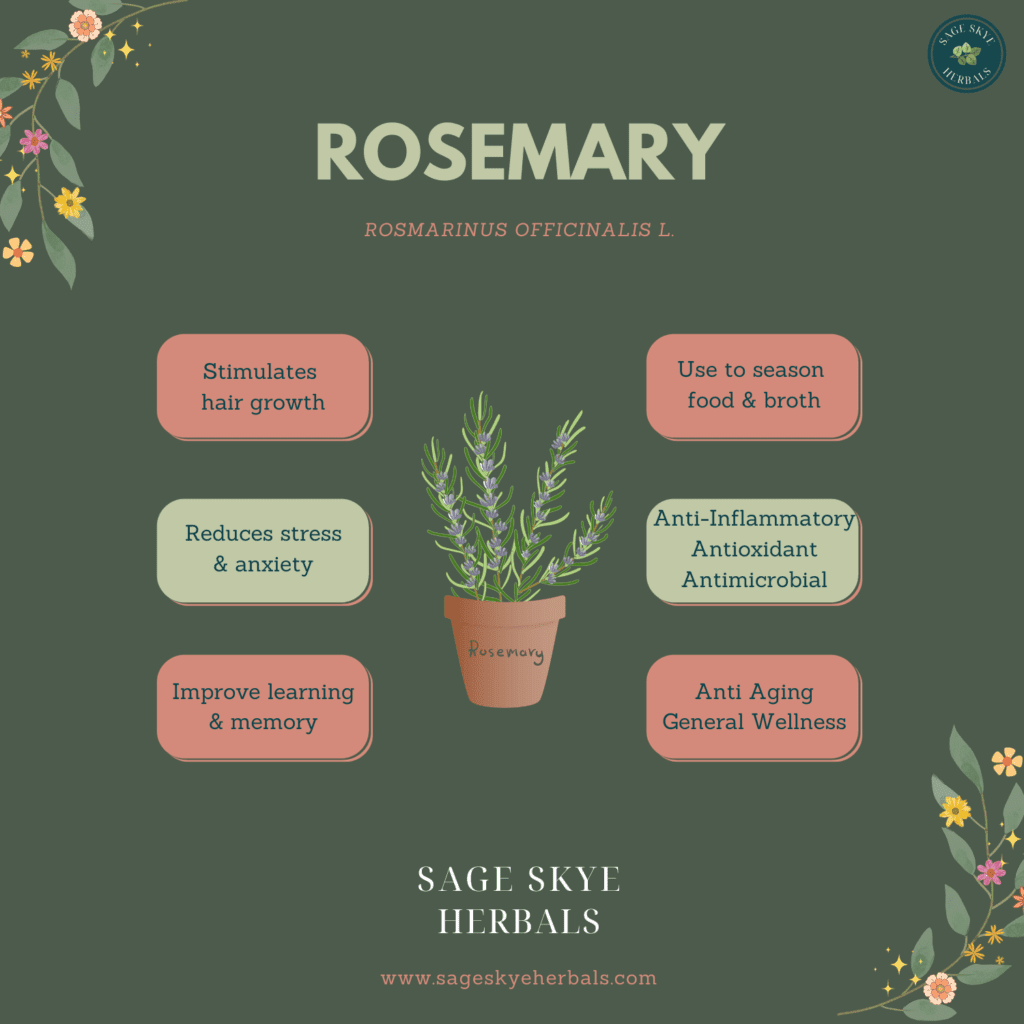
Folklore and Magick Properties
In folk medicine, it has been used as an antispasmodic, mild analgesic, to cure intercostal neuralgia, headaches, migraine, insomnia emotional upset, and depression. (1)
The Ancients were well acquainted with the shrub, which had a reputation for strengthening the memory. On this account, it became the emblem of fidelity for lovers. It holds a special position among herbs because of the symbolism attached to it. Not only was it used at weddings, but also at funerals, for decking churches and banqueting halls at festivals, as incense in religious ceremonies, and in magical spells. (A Modern Herbal)
Preparation
Infusion– Make a weak infusion to drink up to 3 times daily. Make a strong infusion to use as a hair rinse.
Tincture– 10 drop to 3ml up to 3 times daily (Easley and Horne p.296)
Capsule– 500-1,500 mg up to 3 times (Easley and Horne p.296)
Topical Use- Prepare a salve from oil and apply as needed. You can add Rosemary essential oil to already prepared salves, creams, and ointment.
Seasoning: Incorporate 2 to 3 sprigs of rosemary into your broths, utilize the leaves on pasta or pizza, and enhance the flavor of steak by infusing it with butter. A myriad of dishes can be enhanced and enjoyed through the addition of rosemary.
Safety and Precautions
Do not take essential oils internally. Essential oils are to be used topically only and should be diluted with a carrier oil before use. Highly concentrated forms of herbs are not recommended for pregnant women. Always speak with your healthcare provider before using and check any interactions with prescription medication. Work with a registered clinical herbalist for a holistic plan of care.
Disclaimer: These statements have not been evaluated by the Food and Drug Administration. This product is not intended to diagnose, treat, cure or prevent any disease.
Sources
- https://www.ncbi.nlm.nih.gov/pmc/articles/PMC7585774/
- https://pubmed.ncbi.nlm.nih.gov/27527000/
- Solhi H, Salehi B, Alimoradian A, Pazouki S, Taghizadeh M, Saleh AM, Kazemifar AM. Beneficial Effects of Rosmarinus Officinalis for Treatment of Opium Withdrawal Syndrome during Addiction Treatment Programs: A Clinical Trial. Addict Health. 2013 Summer-Autumn;5(3-4):90-4. PMID: 24494164; PMCID: PMC3905473. (PubMed)
- https://www.botanical.com/botanical/mgmh/r/rosema17.html
- de Oliveira, J.R., Camargo, S.E.A. & de Oliveira, L.D. Rosmarinus officinalis L. (rosemary) as therapeutic and prophylactic agent. J Biomed Sci 26, 5 (2019). https://doi.org/10.1186/s12929-019-0499-8 (BMC)
- https://www.ncbi.nlm.nih.gov/pmc/articles/PMC8513767/
- https://www.ncbi.nlm.nih.gov/pmc/articles/PMC7595365/
- Aguilar, Fernando, et al. “Use of rosemary extracts as a food additive-Scientific opinion of the panel on food additives, flavourings, processing aids and materials in contact with food.” EFSA J 721 (2008): 1-29. (Google Scholar)
- https://www.ncbi.nlm.nih.gov/pmc/articles/PMC5685262/
- Chevallier, Andrew. Encyclopedia of Herbal Medicine. 2016
- Easley, Thomas, and Steven H. Horne. The Modern Herbal Dispensatory: A Medicine-Making Guide. North Atlantic Books, 2016.
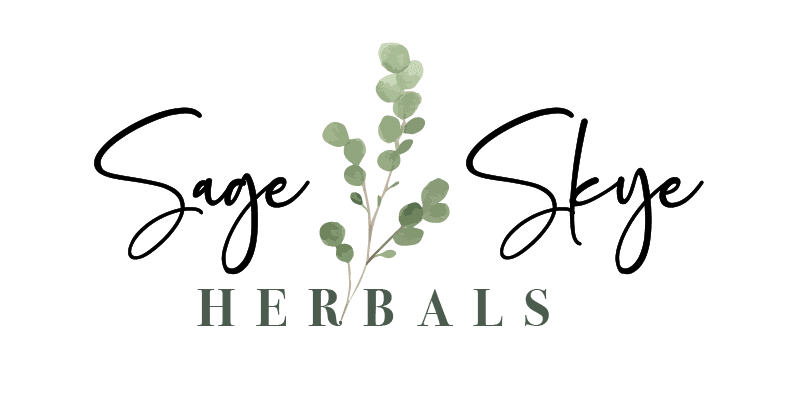
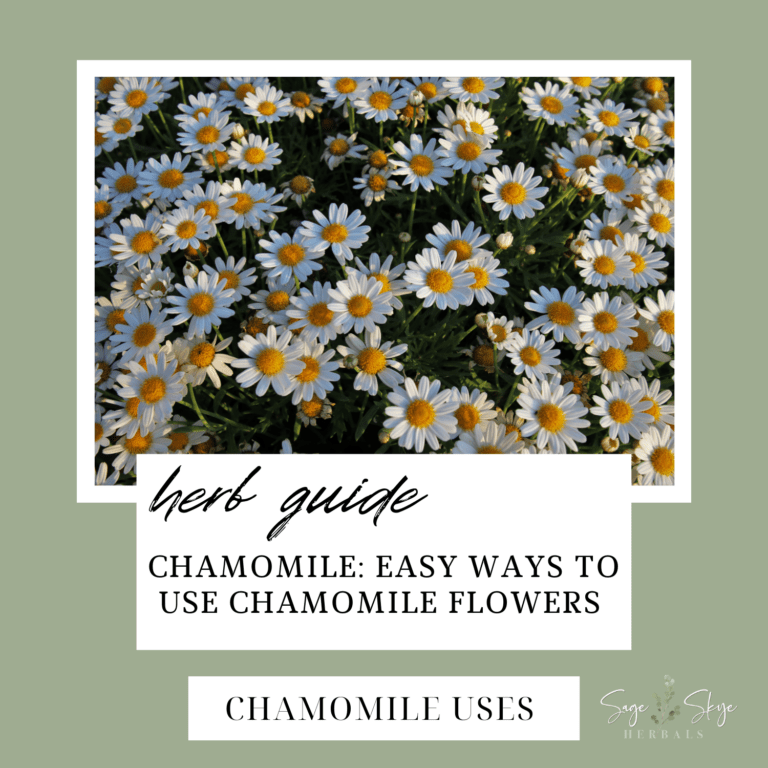
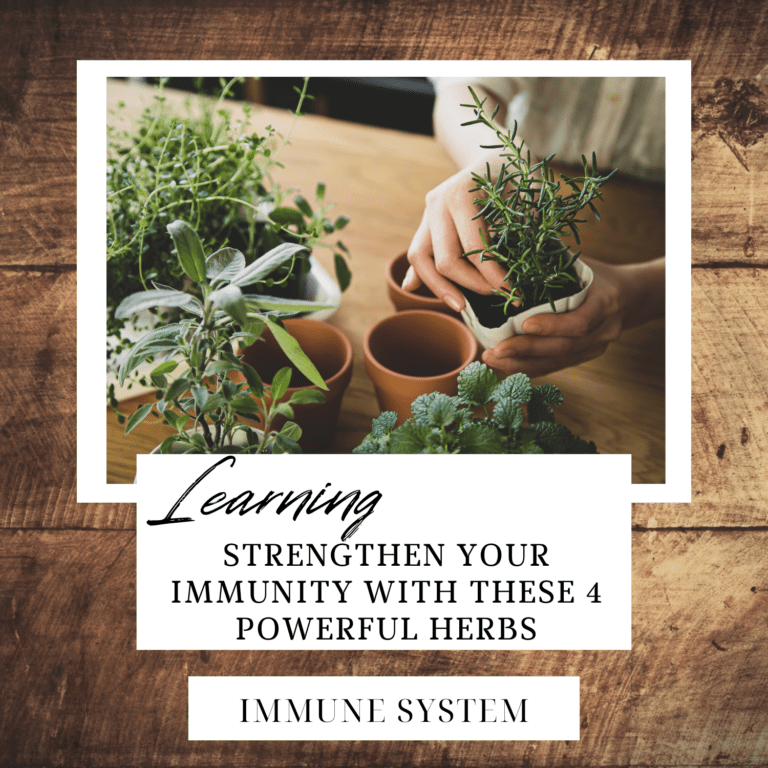
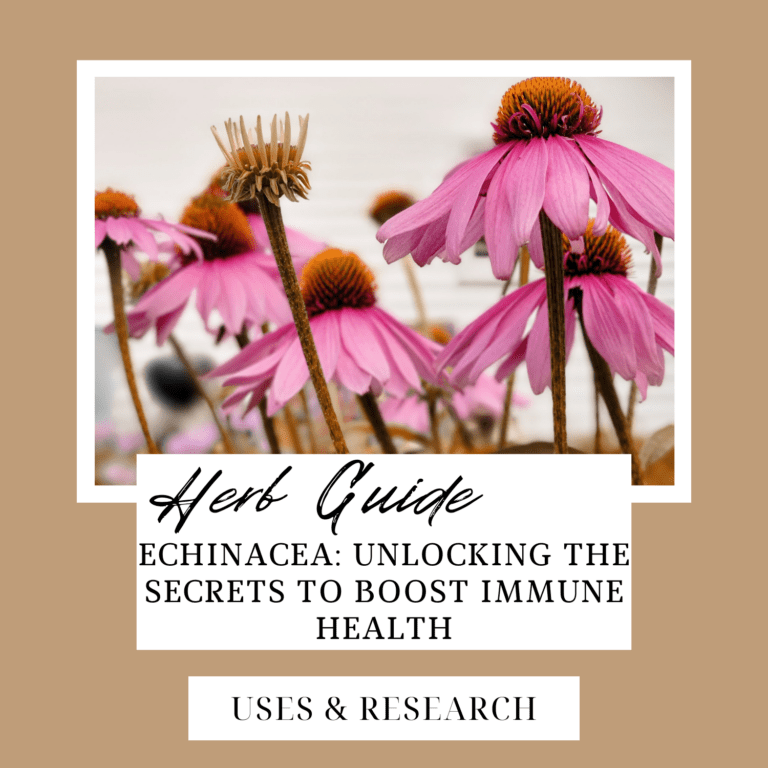
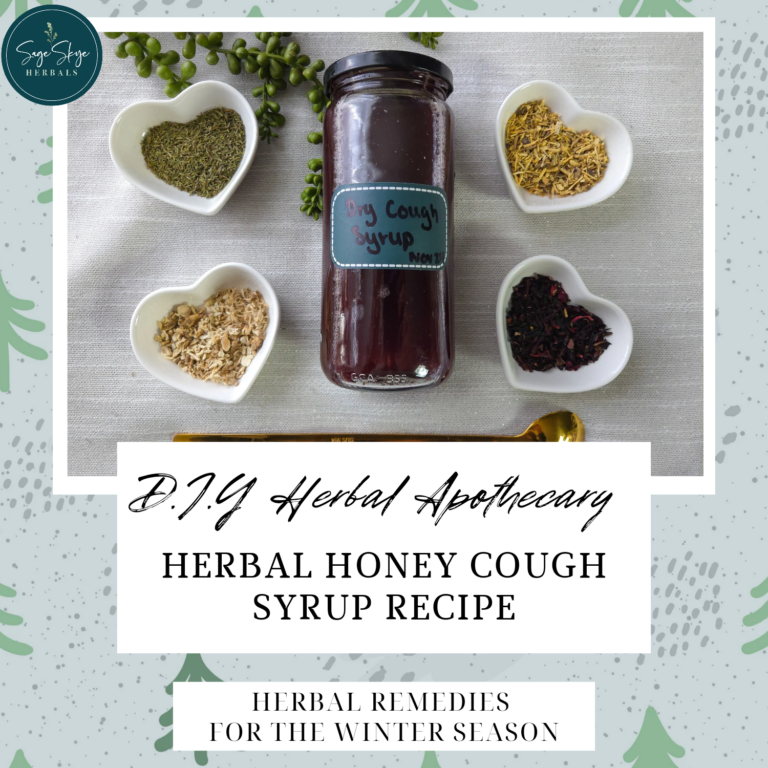
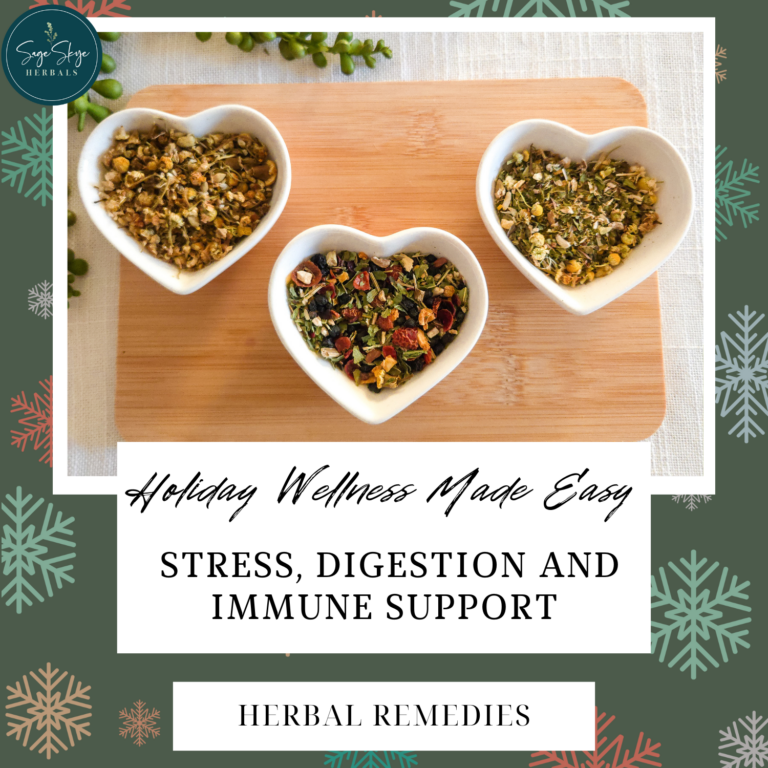
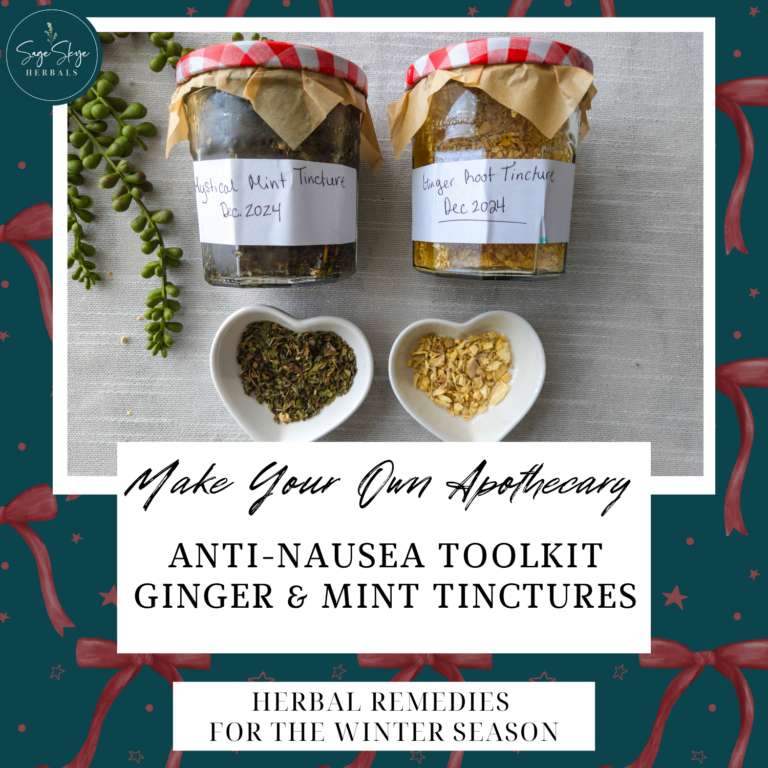
Unbelievable everything spices can do!
I agree! They are a great addition to our diet 🙂